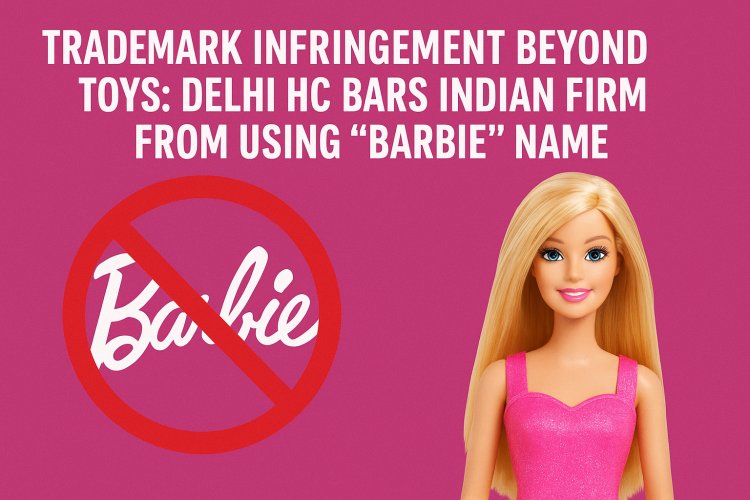Trademark Infringement Beyond Toys: Delhi HC Bars Indian Firm from Using “Barbie” Name
The Delhi High Court has issued an interim injunction restraining an Indian businessman from using the “Barbie” trademark, reinforcing Mattel Inc.’s exclusive rights over the globally recognized brand. The judgment emphasizes the broad protection granted to well-known marks, extending beyond product categories such as toys to services like hospitality and catering. By upholding the concept of “initial interest confusion” and recognizing “Barbie” as a coined, distinctive term, the court reaffirmed the importance of safeguarding brand reputation in the digital and social media era. This decision marks a pivotal moment for brand owners in India, highlighting the judiciary’s strong stance against trademark dilution and unauthorized commercial exploitation of famous marks.

INTRODUCTION
The Delhi high court has once again reaffirmed the board protection granted to famous trademarks and once again delivered a significant ruling in a trademark dispute that could reshape the way social media-related trademark cases are viewed in India. In a recent case, the court granted as ad-interim injunction in favour of Mattel, inc., the American toy giant and owner of the globally renowned “barbie” trademark. While this order directly protects Mattel’s rights, its broader importance lies in the intellectual property right (IPR) PRESPECTIVE- IT Highlights evolving judicial approaches to trademark enforcement in the digital age. The order restrained an Indian businessman, Padum Borah, from using the word “Barbie” across various business unrelated to toys ---including kitchenware, catering, hospitality, and event management services.
CASE BACKGROUND
Mattel, inc. has held registration for the mark “Barbie” in India since 1985 and has been using it extensively in connection with dolls and toys since 1987. Over decades, the mark has achieved worldwide fame, becoming one of the most recognisable brands in the world.
Padum, however, adopted several trade names such as “barbie enterprises,” “barbie hospitality,” “barbie kitchen mart,” and “barbie catering.” These names were used across social media platform, websites, and domain registration. Mattel approached the Delhi high court seeking urgent relief, arguing that Borah’s use of the word “barbie” infringed its trademark and attempted to ride on its goodwill.
WHY THIS MATTERS: THE POWER OF A “WELL-KNOWN TRADEMARK”
The Delhi high court’s decision, presided over by justice Manmeet Pritam Singh Arora, hinged on the classification of “BARBIE’ as a “well-known trademark. “in trademark law, a well-known mark enjoys a higher degree of protection. This means its owner can prevent unauthorised use even for goods or services that entirely dissimilar to those for which the mark is originally registered.
The rationale is clear: such marks have transcended their primary product category and acquired immense public recognition and goodwill. Allowing unrelated parties to use them would not only cause “initial interest confusion” among consumers but also “dilute” the distinctive character and reputation of the original brand.
THE HIGH COURT GRANTED THE AD-INTERIM INJUNCTION BASED ON THE FOLLOWING PRINCIPLES:
1. “INITIAL INTEREST CONFUSION”: the court specifically observed that the defendant had adopted the famous mark “barbie” as the dominant prefix to “create an intial interest in the mind of the consumer” for their products and services. This practice leverages the reputation of the famous mark, even if the final purchase is of the defendant’s products.
2. COINED TERM AND DILUTION: since “BARBIE” is a coined word with no descriptive meaning, its use by an unrelated business was found to be without any reasonable explanation, clearly indicating an intent to ride on Mattel’s goodwill. The court noted that the infringing marks were visually, phonetically, and conceptually identical to Mattel’s mark.
3. DECEPTIVELY SIMILAR: “by using marks like “BARBIE ENTERPRISES” and “BARBIE KITCHEN MART,” the defendant was deemed to be infringing and passing off their goods as being associated with Mattel.
4. BALANCE OF CONVENIENCE AND IRREPARABLE HARM: the court held that Mattel had established a prima facie case and that the balance of convenience lay with mattel, as continued unauthorised use would cause grave irreparable harm to the established brand equity and reputation.
To know more about this you can follow the link below:
CONSEQUENTYY, THE COURT ISSUED A COMPREHENSIVE INJUNCTION, DIRETING INDIAN FIRM TO:
· Immediately cease and desist from using the “BARBIE” trademark or any deceptively similar marks for any of their goods or services.
· Remove all “BARBIE”- branded content from social media platform, websites, and other digital presence.
· Suspend domain names that incorporate the word “BARBIE.”
IMPLICATIONS AND THE FUTURE OF BRAND PROTECTION
This Delhi high court is a significant victory for brand owners, particularly those with globally recognized trademarks. It reinforces several critical principles of intellectual property law:
1. STRONGER PROTECTION FOR WELL-KNOWN MARK: it solidifies the position that well-known trademarks are protected across classes and industries, preventing opportunities individuals from exploiting established brand equity.
2. DETERRENT AGAINST BRAND MISAPPROPRIATION: the swift and decisive action serves as a powerful deterrent against others who might consider using famous brand names for their own unrelated ventures.
3. CONSUMER PROTECTION: ultimately, trademark law also serves to protect consumer from confusion and deception, ensuring they can reliably associate products and services with their legitimate sources.
PRACTICAL TAKEWAYS FOR BUSINESSES
1. Avoid using famous marks in trade names, domains, or social handles – even if your goods and services are unrelated.
2. conduct thorough clearance searches before adopting a brand name.
3. for brand owner: monitor and enforce rights promptly to prevent dilution.
4. for startups: invest in building a distinctive identity rather than attempting to ride on the goodwill of globally known marks.
CONCLUSION
In an increasingly interconnected market, where brand names are powerful assets, this judgement sends a clear message the boundaries of trademark protection for iconic brands like “BARBIE” extend far beyond their traditional domains. For businesses looking to establish their identity, originality remain paramount, as attempting to ride on the coattails of giant will inevitably lead to legal consequences. The “BARBIE” brand, it seems, isn’t just a toy; it’s a legal force to reckoned with, safeguarding its legacy across the entire spectrum of commerce.












